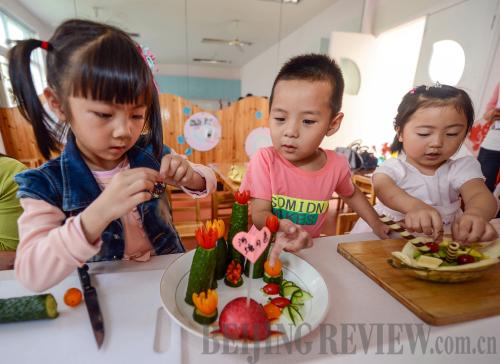|
 |
|
LEARN TO LOVE: Children in Xiangfu Art Kindergarten in Hangzhou, Zhejiang Province, learn to prepare food for their mothers on May 10 (XU YU) |
"Now, only children enjoy their parents' company only after they get off work in the evening. They are too lonely," Chen told zjnews.com.cn, a local news portal.
In the Xisanqi neighborhood of Beijing's Haidian District, the mothers of a trio of 3-year-old boys often make appointments so that their sons can play in their residential compound together. In winter when it is too cold to stay outdoors for long, they bring their children together at a neighborhood recreational facility.
Some parents, who do not know their neighbors well, even look for companions for their children on the Internet. A netizen known as Zhuoyue in Xi'an in northwest China's Shaanxi Province is one of them. She said although she herself is also an only child, when she was young, she still had cousins to play with. Now her daughter, who has no siblings or cousins, usually plays alone. Zhuoyue worries if this situation persists, her daughter will have trouble communicating with others.
Early-education frenzy
Leaving their offspring to their parents does not mean that the post-80s have neglected their kids' education. On the contrary, fearful that their children might be left behind at the starting line, they are busy chauffeuring their progeny to various early-education classes, often at considerable expense.
When Lu Cong, a post-80s woman in Beijing, was expecting a baby, she was determined to give her child a carefree childhood. However, she changed her mind when the baby was barely 6 months old.
After she learned that most children in her neighborhood had taken some early-education classes, Lu worried that her child's intellectual development would suffer.
Parents send their children to training classes on a variety of subjects, such as painting, singing, dancing, piano playing, skating, English language learning and martial arts. This March, a 6-year-old's online resume grabbed much attention with claims that the kindergartener can write more than 300 Chinese characters and can add and subtract double-digit numbers.
Besides regular kindergarten classes, the child has completed English language courses in a well-known early-education institution and piano lessons from music teachers of a top music conservatory. Every day, the child plays piano for at least half an hour. The child, also good at sports, has practiced martial arts in a renowned sports school in Beijing and received professional training in roller skating. The kid has won prizes in ice hockey and martial arts competitions.
While parents attach great importance to their children's intellectual development, some have not paid enough attention to their moral education.
The Shanghai Women's Federation once surveyed the parents of 1,054 minors on domestic educational priorities. Among them, 80 percent of responding families focused on imparting knowledge. For 64 percent of families, physical education was given importance. Only 54 percent of families said they considered moral education to be a major priority.
"Family education is important in building character and cultivating manners," said Xie Boyu, a teacher at No.2 Kindergarten in Wuhai City, north China's Inner Mongolia Autonomous Region.
"Now families hover around children, which contradicts China's traditional reverence for seniority. If a family fawns too much attention to the child first rather than its elders, over time, the child will become selfish, and will not be sensitive to the feelings of others."
Email us at: wanghairong@bjreview.com | 